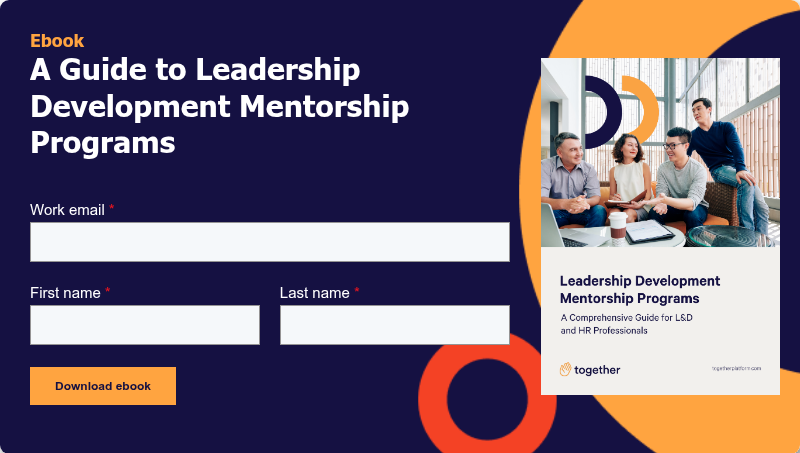Here's a hard truth that many L&D professionals learn too late: being a successful leader doesn't automatically make someone an effective mentor. In fact, some of your organization's most accomplished executives might be the worst mentors for your leadership development program.
According to Harvard Business Review research, 54% of respondents rated mentoring as very or extremely effective compared to just 35% for traditional skills training. But here's the catch—that effectiveness depends entirely on having the right mentors who are properly prepared for their role.
The difference between a transformational mentorship experience and a disappointing one often comes down to mentor selection and preparation. This guide will walk you through how to identify, recruit, and develop mentors who can truly accelerate leadership development in your organization.
Understanding what makes an effective leadership mentor
Before diving into selection criteria, it's crucial to understand what distinguishes effective mentors from well-meaning volunteers. The best leadership mentors possess a unique combination of experience, skills, and mindset that goes far beyond their own leadership success.
The mentor mindset
Effective mentors approach the relationship with genuine curiosity about their mentee's development. They're not trying to create mini-versions of themselves or simply share war stories from their career. Instead, they're focused on helping mentees discover their own leadership style and capabilities.
Key mindset characteristics include:
- Growth orientation: Belief that leadership capabilities can be developed
- Generosity: Willingness to invest time and energy in others' success
- Humility: Recognition that they don't have all the answers
- Curiosity: Genuine interest in understanding different perspectives
- Patience: Understanding that development takes time and iteration
Essential competencies for mentors
Beyond mindset, effective mentors need specific competencies that enable them to guide leadership development:
Communication and interpersonal skills:
- Active listening and empathetic understanding
- Ability to ask powerful, thought-provoking questions
- Skill in providing constructive feedback
- Comfort with vulnerable, authentic conversations
Coaching and development abilities:
- Experience developing others throughout their career
- Understanding of different learning styles and preferences
- Ability to recognize and build on strengths
- Skill in helping others navigate challenges and setbacks
Leadership expertise:
- Demonstrated success in leadership roles
- Broad understanding of leadership challenges across functions
- Experience with organizational change and transformation
- Knowledge of industry trends and business dynamics
Mentor selection criteria that actually work
Now that you understand what makes an effective mentor, you can develop selection criteria that go beyond title and tenure. The most successful mentorship programs use a comprehensive assessment approach that evaluates both qualifications and fit.
Primary selection criteria
Proven track record of developing others. Look for leaders who have consistently developed talent throughout their careers. This might include:
- Direct reports who have been promoted to leadership roles
- Informal mentoring relationships they've maintained
- Leadership in high-potential employee development
- Recognition for talent development contributions
Emotional intelligence and self-awareness. Mentoring requires high emotional intelligence to navigate complex interpersonal dynamics. Assess candidates for:
- Self-awareness of their own leadership style and blind spots
- Ability to read and respond to others' emotional states
- Skill in managing difficult conversations and conflicts
- Comfort with receiving feedback about their mentoring approach
Communication and listening skills. Effective mentors are skilled communicators who can adapt their style to different personalities and situations. Look for:
- Clear, thoughtful communication in various settings
- Demonstrated active listening abilities
- Comfort with asking questions rather than providing all the answers
- Ability to explain complex concepts in accessible ways
Time availability and genuine commitment. Mentoring requires consistent time investment and authentic engagement. Ensure candidates have:
- Realistic understanding of time requirements
- Genuine interest in developing others (not just resume building)
- Support from their manager for mentoring participation
- Track record of following through on commitments
Secondary selection criteria
Diverse perspectives and experiences. Build a mentor pool that reflects diverse experiences, backgrounds, and leadership styles:
- Different functional areas and business units
- Various career paths and progression patterns
- Diverse demographic backgrounds and perspectives
- Range of leadership styles and approaches
Organizational knowledge and networks. Mentors should understand how to navigate your specific organizational context:
- Knowledge of company culture, values, and unwritten rules
- Understanding of career progression paths and requirements
- Network of relationships that can benefit mentees
- Insight into organizational challenges and opportunities
Industry expertise and forward-thinking. Look for mentors who can provide broader perspective beyond your organization:
- Understanding of industry trends and competitive dynamics
- Experience with change management and transformation
- Knowledge of emerging leadership challenges
- Connections to external networks and learning opportunities
The mentor recruitment process
Once you've defined your selection criteria, you need a systematic recruitment process that attracts high-quality candidates while setting clear expectations from the start.
Sourcing potential mentors
Executive nomination process. Work with senior leadership to identify potential mentors:
- Ask executives to recommend leaders who excel at developing others
- Review performance reviews for evidence of talent development
- Consider 360-feedback results highlighting development capabilities
- Look for leaders who have requested development opportunities for their teams
Self-nomination with screening. Allow interested leaders to volunteer while maintaining quality standards:
- Create clear job descriptions for mentoring roles
- Require written applications explaining their interest and qualifications
- Conduct screening interviews to assess fit and commitment
- Verify manager support for their participation
Strategic recruitment. Actively recruit specific individuals based on program needs:
- Target leaders with expertise in key development areas
- Recruit for demographic and functional diversity
- Approach high-potential leaders as development opportunities
- Consider retired executives or external industry leaders
Application and assessment process
Comprehensive application. Collect detailed information about potential mentors:
- Leadership experience and career progression
- Previous mentoring or development experience
- Specific expertise and knowledge areas
- Availability and time commitment preferences
- Motivation for participating in the program
Behavioral interviewing. Conduct structured interviews focused on mentoring competencies:
- "Tell me about a time you helped someone develop a new skill"
- "Describe how you would handle a mentee who wasn't making progress"
- "What's your approach to giving difficult feedback?"
- "How do you adapt your communication style to different personalities?"
Reference validation. Verify mentoring capabilities through references:
- Speak with individuals they've previously mentored
- Get input from their current manager or colleagues
- Validate specific examples of development impact
- Confirm their reputation for developing others
Preparing mentors for success
Even your most qualified mentors need preparation to be effective in your specific program context. Comprehensive training ensures consistency, quality, and confidence across your mentor pool.
Core training components
Program overview and expectations. Help mentors understand their role within the broader program:
- Program goals, structure, and timeline
- Mentor responsibilities and time commitments
- Available resources and support systems
- Success metrics and evaluation processes
Mentoring fundamentals. Build foundational mentoring skills:
- Different mentoring styles and when to use them
- Goal setting and development planning techniques
- Effective feedback delivery and difficult conversations
- Building trust and psychological safety
Leadership development focus. Align mentors around leadership-specific development:
- Your organization's leadership competency model
- Common leadership challenges for emerging leaders
- Specific development opportunities and resources
- How to recognize and build on leadership potential
Practical tools and resources. Equip mentors with concrete tools for their relationships:
- Conversation guides and question frameworks
- Goal-setting templates and tracking tools
- Resource libraries and recommended readings
- Assessment tools and development exercises
Training delivery methods
Intensive workshop sessions .Bring mentors together for focused training:
- Two-day intensive covering all core components
- Interactive exercises and role-playing scenarios
- Peer learning and best practice sharing
- Q&A sessions with experienced mentors
Ongoing development opportunities. Provide continuous learning and support:
- Monthly mentor circles for peer consultation
- Guest speakers on specialized topics
- Advanced training modules for experienced mentors
- Access to external mentoring resources and conferences
Just-in-time support. Offer targeted help when mentors need it most:
- Quick reference guides for common situations
- Expert consultation for challenging relationships
- Troubleshooting resources and escalation paths
- Regular check-ins with program administrators
Setting mentors up for ongoing success
Training is just the beginning. The most successful programs provide ongoing support that helps mentors continuously improve their effectiveness.
Regular feedback and coaching. Help mentors reflect on and improve their approach:
- Quarterly feedback sessions with program administrators
- Peer coaching circles for shared learning
- 360-degree feedback from mentees (anonymized)
- Individual coaching for mentors facing challenges
Resource updates and refreshers. Keep mentors current with new tools and approaches:
- Regular updates to conversation guides and resources
- Advanced training modules on specialized topics
- Access to latest research on leadership development
- Connections to external mentoring communities
Recognition and appreciation. Acknowledge mentors' contributions to maintain engagement:
- Public recognition of outstanding mentoring
- Inclusion in program success stories and case studies
- Professional development opportunities as program benefits
- Networking events connecting mentors across the organization
Common mentor selection mistakes to avoid
Learning from others' mistakes can save your program from common pitfalls that undermine mentor effectiveness.
The "successful leader = good mentor" fallacy
Many programs automatically recruit their highest-performing executives as mentors, assuming that leadership success translates to mentoring effectiveness. This often backfires because:
- High achievers may lack patience for others' learning processes
- They might not remember what it's like to struggle with leadership challenges
- Their natural talents may not translate to teachable skills
- They may be too busy to provide adequate attention to mentees
Instead: Look for leaders who have demonstrated development capabilities, regardless of their hierarchical level.
Overlooking diversity, equity, and inclusion
Programs that recruit mentors primarily from existing senior leadership often perpetuate homogeneity and limit mentees' exposure to diverse perspectives.
Instead: Actively recruit mentors from diverse backgrounds, career paths, and leadership styles to provide rich learning experiences for all mentees.
Insufficient screening and preparation
Some programs recruit anyone willing to volunteer, assuming that good intentions are enough for effective mentoring.
Instead: Implement rigorous selection criteria and mentor training to ensure all mentors can contribute meaningfully to leadership development.
Neglecting ongoing support
Many programs provide initial training but then leave mentors to figure things out on their own, leading to inconsistent quality and frustrated participants.
Instead: Build ongoing support, feedback, and development opportunities into your program design from the beginning.
Measuring mentor effectiveness
To continuously improve your mentor selection and preparation processes, you need systematic ways to measure mentor effectiveness and impact.
Quantitative metrics
Mentee progress and outcomes:
- Goal achievement rates for mentees
- Leadership competency improvements
- Promotion and retention rates
- Performance rating changes
Relationship quality indicators:
- Meeting frequency and consistency
- Program completion rates
- Mentee satisfaction scores
- Relationship duration beyond formal program
Qualitative assessment
Mentee feedback:
- Regular surveys about mentor effectiveness
- Focus groups on mentoring experience quality
- Exit interviews exploring relationship impact
- Long-term follow-up on development influence
Mentor self-assessment:
- Reflection on their own development as mentors
- Challenges faced and support needed
- Satisfaction with the mentoring experience
- Recommendations for program improvements
Building your mentor excellence strategy
Creating a pool of exceptional mentors requires ongoing investment and attention. The most successful programs treat mentor development as a continuous improvement process rather than a one-time training event.
Start with your selection criteria: Use the framework in this guide to identify and recruit mentors who have both the capability and commitment to drive leadership development.
Invest in comprehensive preparation: Don't shortcut the training process. Mentors need both foundational skills and program-specific knowledge to be effective.
Provide ongoing support: Build systems for continuous feedback, development, and recognition that keep mentors engaged and improving.
Measure and iterate: Use data to continuously refine your selection criteria and preparation approaches based on what actually drives mentoring effectiveness in your organization.
Transform your leadership development through better mentoring
The quality of your mentors determines the quality of your leadership development outcomes. By implementing rigorous selection criteria and comprehensive preparation processes, you can build a mentor pool that truly accelerates leadership development across your organization.
For a complete guide to building world-class leadership mentorship programs, including detailed mentor assessment tools, training curricula, and program management frameworks, download our comprehensive ebook: "Leadership Development Mentorship Programs: A Comprehensive Guide for L&D and HR Professionals."
This resource provides everything you need to select, prepare, and support mentors who will transform your leadership development efforts and drive measurable business impact.
Download the Leadership Development Mentorship Programs Ebook →



.svg)




.jpg)


.svg)

